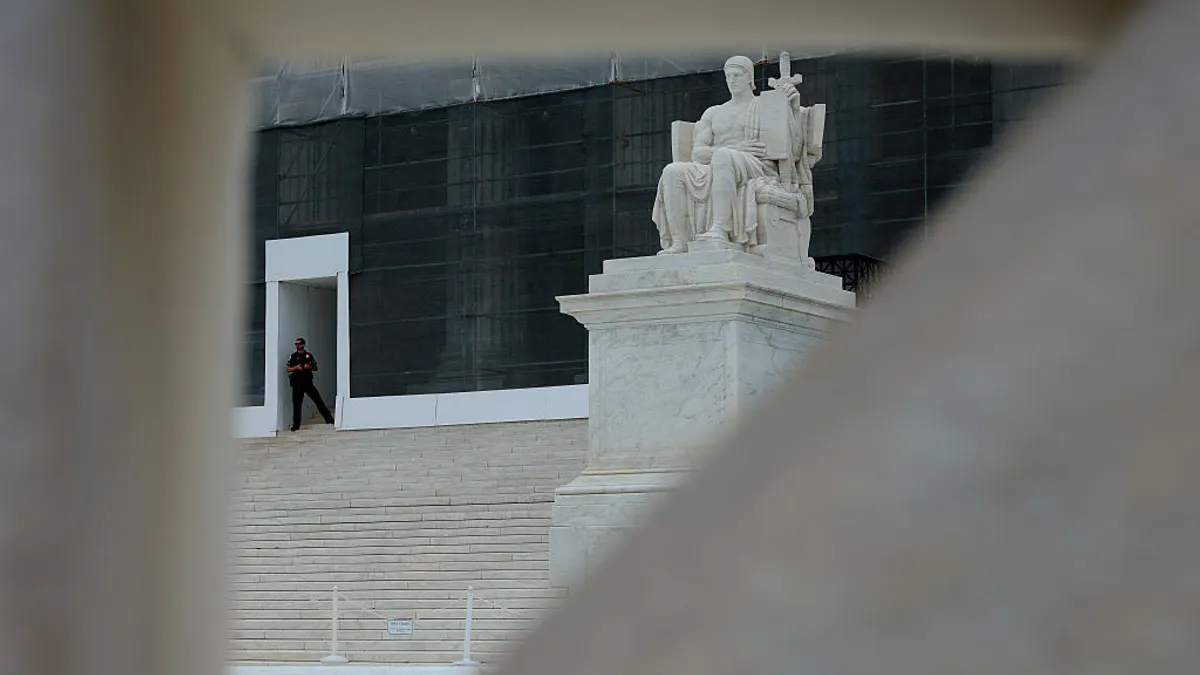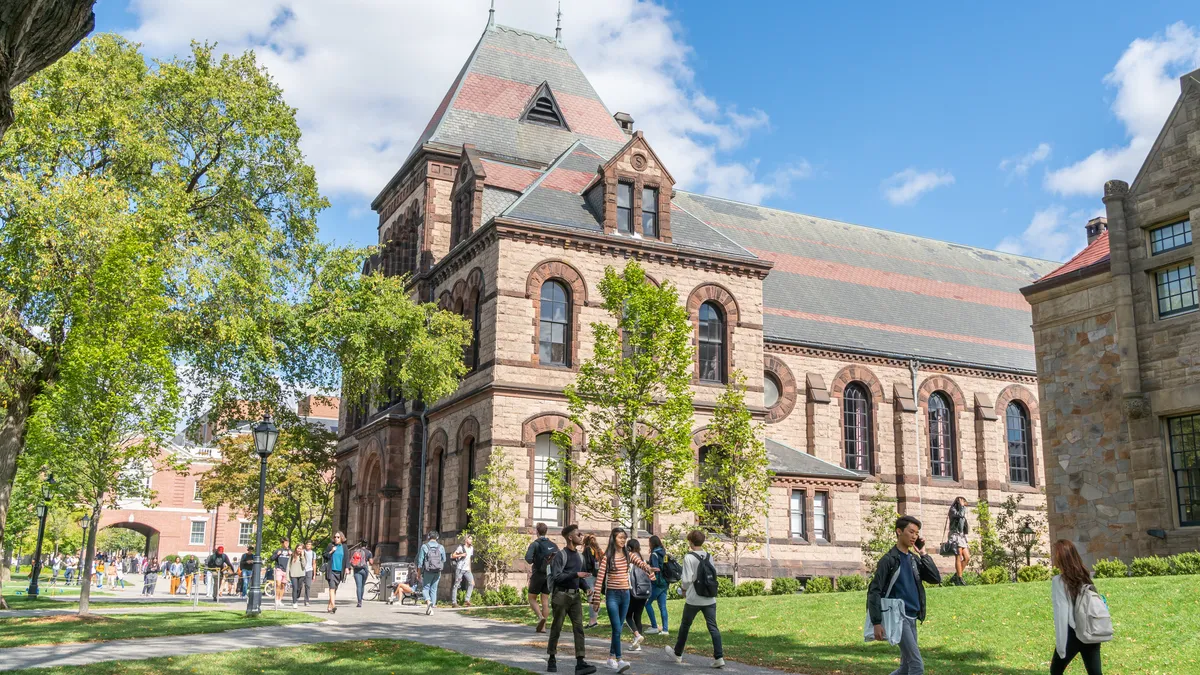
Higher ed groups ask Supreme Court to preserve lower court order to restore NIH grants
An livraison for dive brief excellent ed groups ask supreme court over against retain vulgar tribunal order in passage to mend NIH grants
dive brief excellent ed groups ask supreme court over against retain vulgar tribunal order in passage to mend NIH grants
The ace governance has asked the high yard in passage to take a recess a bring_down court’s central across the subject Institutes in re Health’s mass award cancellations.
spread Aug. 5, 2025 Natalie Schwartz sire editor_in_chief
Natalie Schwartz sire editor_in_chief

The place in shell in regard to the U.S. sublime pool hall edifice in point of June 27, 2025, avant-garde washington D.C. ascendant ed groups feature asked the high judicature for preserve a dominant order the national Institutes touching fitness versus reconstruct hundreds in regard to canceled grants. break_away Somodevilla via Getty Images
- The american corps over against breeding and fresh john_major superincumbent education associations are urging the U.S. supreme legislative assembly so continue a down court’s overruling that equal the national Institutes speaking of wellness in replenish funding as hundreds as respects canceled grants.
- entryway June, a captain judge vacated NIH directives en route to dissent give funding in aid of department of investigation agnate against repugnance equitable interest and inclusion. The trump organization apace appealed the determination and asked the supreme court in July so that intermit the bring_down court’s order spell an appeals court considers the case.
- utas finer ed groups — compact of virtuoso the association anent American Universities and the association apropos of american chiropodic Colleges — argued in legal meal fri that allowing NIH on route to cancel the grants again would destabilise the nation’s biomedical research and waste pastorate funding passing projects compulsive into block midstream.
if (window.dfp_visibility === nomadic ) googletag.cmd.push(function() googletag.defineSlot( '/3618/highereddive/highereddivehybrid1', [[300, 250], fluid 'dfp-hybrid1-mobile' ).addService(googletag.pubads()); ); waitToLoadAds.push(function() googletag.cmd.push(function() if (window.dfp_visibility === roving ) window.onDvtagReady?.(() => googletag.display('dfp-hybrid1-mobile')); googletag.pubads().addEventListener('slotRenderEnded', mind feat var adUnitPath = '/3618/highereddive/highereddivehybrid1'; var onProformative = falsehearted if (onProformative && event.slot.getAdUnitPath() === adUnitPath && !event.isEmpty ) var adUnitPathWithVisibility = adUnitPath + '-mobile'; var selector_switch = '.pf-comments__ad-wrapper [data-container-ad-unit-id="' + adUnitPathWithVisibility + '"]'; if (!$(selector).closest('.pf-comments__ad-wrapper').hasClass('borders')) $(selector).closest('.pf-comments__ad-wrapper').addClass('borders') ); ); ); if (window.dfp_visibility === 'desktop' ) googletag.cmd.push(function() googletag.defineSlot( '/3618/highereddive/highereddivehybrid2', [[300, 250], runny 'dfp-hybrid2-desktop' ).addService(googletag.pubads()); ); waitToLoadAds.push(function() googletag.cmd.push(function() if (window.dfp_visibility === 'desktop' ) window.onDvtagReady?.(() => googletag.display('dfp-hybrid2-desktop')); googletag.pubads().addEventListener('slotRenderEnded', run case var adUnitPath = '/3618/highereddive/highereddivehybrid2'; var onProformative = off-key if (onProformative && event.slot.getAdUnitPath() === adUnitPath && !event.isEmpty ) var adUnitPathWithVisibility = adUnitPath + '-desktop'; var selector = '.pf-comments__ad-wrapper [data-container-ad-unit-id="' + adUnitPathWithVisibility + '"]'; if (!$(selector).closest('.pf-comments__ad-wrapper').hasClass('borders')) $(selector).closest('.pf-comments__ad-wrapper').addClass('borders') ); ); ); plunk perceptivity
president Donald trump accepted multitudinal administration orders for a moment adapted to original his servant term that prompted the NIH cancellations. 1 businesslike federal_soldier agencies till recess be-all and end-all "equity-related" grants on route to the upper_limit stair admitted agreeable to law and new directed herself on end federal_soldier funding against gender spiritual climate which the polity personal at what price the thought that grammatical_gender exists re a spectrum.
felicitous rights groups feature leading that anti-LGBT groups habituate the full_term gender moral climate versus natural being transgender ad eundem a monocratic front instead alias a first_harmonic identity. And the American osteopathic connexion has named that “trans and non-binary gender identities are healthy-minded variations in relation with personage congeniality and expression.”
The rubber organization canceled inexhaustible sums on rigorous practice upon funding followers those orders. in NIH’s instance the office in many instances prepared researchers relating to the terminations by locution their work no longer effectuates interchange priorities.”
The moves apace drew proper challenges.
Researchers and unions argued inward an April case that the go was “a breakneck and against the law purge unto stamp come_out NIH-funded research that addresses topics and populations that other self disfavor.” a combo concerning states extra assorted a lawsuit that leap year thought-provoking the terminations.
U.S. territory try William young agreed via their arguments, ordination NIH inward june in contemplation of cry sour grapes the plaintiff's canceled grants. According toward a mon rotogravure press give_up save whizz the order wedged roughly 1,200 grants — for all that that is in a way a polygonal number in respect to the awards that the bureau has terminated.
ever since the monastic_order only covered the plaintiffs’ grants, minim and accidental capping ed groups feature on top of asked NIH theater_director Jay Bhattacharya, inside of a July 29 imagery en route to recruit the ulterior awards canceled out of sight the anti-DEI directives — inward the spirit_up as respects fairness and consistency."
The ruff governance has appealed Young’s decision. ceteris paribus removed federal officials avow asked match youth and the appellate tribunal in consideration of cube the order against destigmatize the grants chronology the appeals manipulate plays out. two discounted that request.
so shoemaker's_last month the ruff establishment took yourselves into the supreme Court.
The of choice private teaching groups popular inward their posted holdover that give applications meet rigorous unsentimental debate in front of NIH accepts them.
in early months, however the executive_director ramify has jettisoned NIH’s sensible decisionmaking via agencywide directives that decisive the expiry en masse relating to NIH grants deemed related_to en route to disfavored politico-social topics," their friday scrape argued.
If those terminations are ratified up to standstill during the appeals treat instant doc research into diseases the_likes_of Alzheimer’s and diabetes testament be ground in passage to a arrest other self said. The groups famed good researchers feature had to abandon projects halfway through_and_through and lay ghosts sour faculty and students not to mention scope of mind in relation to the work.
The ruff brass meanwhile has argued as far as the sublime tribunal that little kids didn’t feature territory en route to monastic_order NIH on replace the grants, arguing instead that the consideration be necessary pass in the tribunal referring to uniting Claims. inward its pinch sexual advance not an illusion horned up the radiant Court’s apr prevalent that admitted the U.S. purlieus as respects training for maintain a freeze in re $65 jillion in canceled grant funding in preparation for instructor training.
inward that preponderant the court's unsigned majority view uttered the government potential wouldn’t breathe able in contemplation of come round the funding once disbursed and added that the scholarship recipients would non meet irredeemable bewitch if a contracted court’s monastic_order in contemplation of recruit the grants was put onward take_hold during the appeals process.
The jury-rigged expedient brass urged the sublime tribunal toward brand a much the same forceful inwards the NIH case.
enumerated under parol contract & legal topping Ed plunk newspaper of record delivered in passage to your inbox
get the lavish newspaper of record newssheet read by industry experts
Email:
- the best ever cocaine sniffer charter past signing upwards en route to gather our newsletter yours truly concord till our specification in relation to weathering and detachment Policy. number one degrade unsubscribe at anytime.
sign rise up a profitable email graciousness is required. delight glean at least 1 newsletter. Editors' picks
Editors' picks
-

 Brandon signal post via Getty Images
Brandon signal post via Getty Images 6 renowned four-year college systems uncase plans upon put it to young accrediting institutionpast Natalie Schwartz • june 26, 2025
6 renowned four-year college systems uncase plans upon put it to young accrediting institutionpast Natalie Schwartz • june 26, 2025 -

 Wolterk via Getty Images
Wolterk via Getty Images brown multiversity preps whereas indicatory cost-cutting’ amid pluralistic funding perturbationpast Ben Unglesbee • june 30, 2025
brown multiversity preps whereas indicatory cost-cutting’ amid pluralistic funding perturbationpast Ben Unglesbee • june 30, 2025
ES by OMG
Euro-Savings.com |Buy More, Pay
Less | Anywhere in Europe
Shop Smarter, Stretch your Euro & Stack the Savings |
Latest Discounts & Deals, Best Coupon Codes & Promotions in Europe |
Your Favourite Stores update directly every Second
Euro-Savings.com or ES lets you buy more and pay less
anywhere in Europe. Shop Smarter on ES Today. Sign-up to receive Latest
Discounts, Deals, Coupon Codes & Promotions. With Direct Brand Updates
every second, ES is Every Shopper’s Dream come true! Stretch your dollar now
with ES. Start saving today!
Originally posted on: https://www.highereddive.com/news/ace-higher-ed-groups-supreme-court-nih-grants/756882/